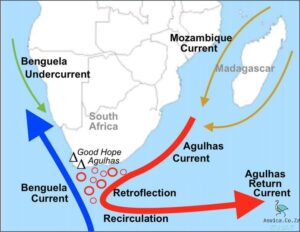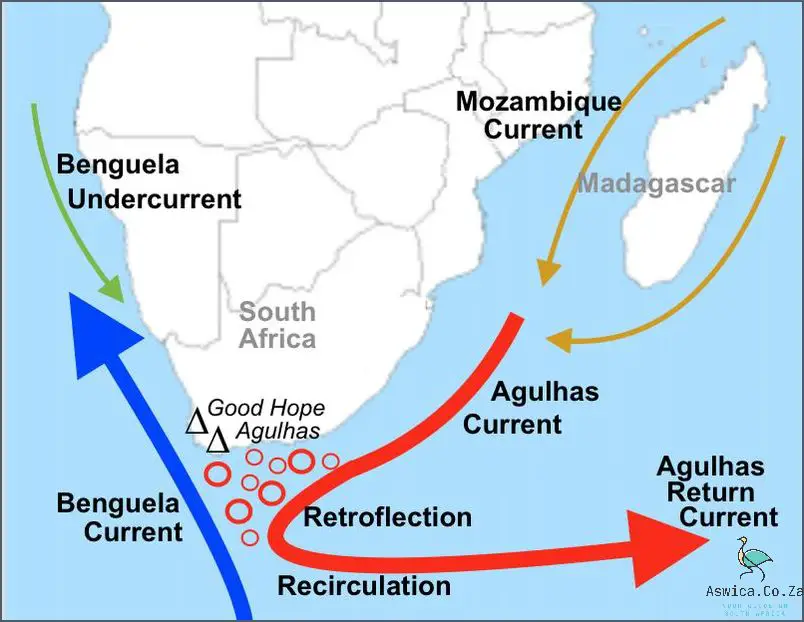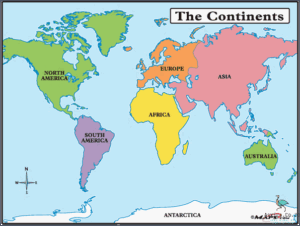
South Africa is a country located on the southern tip of the African continent and is surrounded by the Atlantic and Indian Oceans. As a result, it has a unique oceanography, which includes several major ocean currents. These currents can be divided into two distinct types: the warm Agulhas Current in the Indian Ocean, and the cold Benguela Current in the Atlantic Ocean.
The Agulhas Current is a warm current that flows southward along the east coast of South Africa. It originates from the Indian Ocean and is the largest current in the region. It is also the only warm current in the area, and its warm waters are a vital source of energy for the surrounding ocean and atmosphere. The Agulhas Current is responsible for the warm temperatures and high humidity levels experienced in the region, and also serves as a transportation route for various marine species.
The Benguela Current is a cold current that flows northward along the west coast of South Africa. It originates in the Atlantic Ocean and is the second largest current in the region. Its cold waters are a vital source of nutrients for the surrounding marine ecosystem, and its strong upwelling action brings deep nutrients to the surface, which are then distributed
Contents
Ocean Currents In South Africa
South Africa’s coastline is over 3000km long and is home to the powerful Agulhas Current. This current flows along the South African east coast from the Mozambique Channel, enters the Indian Ocean and then moves southwards towards the Cape of Good Hope. The Agulhas Current is a warm ocean current that is responsible for bringing warm water up from the tropics and is the source of some of South Africa’s warmest weather. As the Agulhas Current flows south it is eventually blocked by the Antarctic Circumpolar Current, which is the most powerful ocean current in the world. As a result, the Agulhas Current splits around the Cape of Good Hope and forms two separate currents, the Agulhas Return Current to the east, and the Benguela Current to the west. The Benguela Current is a cold ocean current that is responsible for cooling the waters along the South African west coast. Both of these currents are important to the biodiversity of South Africa’s coastline, as they bring with them a wide variety of sea life, including warm water species such as dolphins, whales, and sharks.
Description of the Agulhas Current
The Agulhas Current is a powerful ocean current that flows along the eastern coast of South Africa. It is the largest and strongest of all the warm ocean currents in the Indian Ocean, and is one of the most influential currents in the world. The Agulhas Current is also known as the "Greatest of the Indian Ocean’s currents" because of its immense strength and longevity.
The Agulhas Current originates from the Mozambique Channel, where warm water from the Indian Ocean is forced southward by the south-east trade winds. The current then moves south along the African continent, reaching its peak strength in the area of the Cape of Good Hope. It then flows around the Agulhas Bank and moves eastward, eventually reaching the Agulhas Retroflection Point before turning northward and flowing back into the Mozambique Channel.
The Agulhas Current is an important driver of ocean circulation in the Indian Ocean. It is the primary source of heat for the western part of the Indian Ocean, and helps to maintain the higher temperatures found in the western half of the ocean. The Agulhas Current is also an important factor in the formation of the Indian Ocean Gyre, a large circular pattern of ocean currents that encircle the Indian Ocean.
The Agulhas Current is also important to the shipping industry in South Africa. Its strong currents can create hazardous conditions for shipping vessels, making navigation in the area tricky and dangerous. Additionally, the Agulhas Current is an important factor in the formation of the South African coastal upwelling, which brings cold, nutrient-rich waters to the surface and helps to support a wide variety of marine life.
The Agulhas Current is an important part of the global ocean circulation system, and its effects are felt all around the world. Its immense strength and influence help to keep the Indian Ocean warm and productive, and its effects can be seen in the climate patterns, ocean circulation patterns, and marine life of South Africa and the world.
Characteristics of the Benguela Current

The Benguela Current is one of the most interesting and important ocean currents in South Africa. It runs along the south-west African coast and is named after the Benguela Province of Angola. This current is a very important feature of the South African ocean currents, as it affects many other aspects of the local climate, fisheries, and ecology.
The Benguela Current is a cold ocean current that originates in the South Atlantic Ocean and flows south along the western coast of South Africa. It is a western boundary current that is driven by the South Equatorial Current and the southeast trade winds. It is one of the few cold ocean currents that originates in the Southern Hemisphere.
The Benguela Current runs parallel to the South African coast and is characterized by two distinct regions. The northern region is cooler and more nutrient rich, while the southern region is warmer and less nutrient rich. The current is an important source of upwelling nutrients and provides an important habitat for many species of fish.
The Benguela Current is also known for its strong seasonal variability. During the summer, the current is stronger and warmer, while during the winter, it is weaker and cooler. This seasonal variability is mostly driven by the seasonal shifts in the trade winds, which affect the strength of the current.
The Benguela Current is also an important transport route for many marine species, including fish, plankton, and other organisms. It is also a major source of energy for whales and other marine mammals, who use the current to move up and down the coast.
Overall, the Benguela Current is a fascinating and important ocean current in South Africa. It is important for its role in the local climate, fisheries, and ecology, as well as its role in transporting marine species and providing a habitat for many organisms.
Impact of the ocean currents on the South African marine life and ecosystem
The South African coastline is home to a vast array of marine life and ecosystems, and the ocean currents that flow along this coastline play a critical role in their health and resilience. Ocean currents bring essential nutrients to the region, provide protection from storms, and help regulate the temperature of the water. But they also bring risks, as they can carry pollutants, invasive species, and extreme weather events further into the region. It’s essential to understand the impact of ocean currents on the marine life and ecosystems of South Africa in order to ensure their sustainability.
One of the most significant ocean currents in South Africa is the Agulhas current, which flows along the eastern coast of the continent and is part of the South Indian Ocean Gyre. The Agulhas current is a warm water current, with temperatures reaching up to 25°C, and it brings a range of nutrients and oxygen to the region’s marine life. These nutrients are essential for the growth and development of organisms, including fish, algae, and plankton. The presence of the Agulhas current also helps protect the region’s shoreline from storms.
The Agulhas current also brings potential risks to the region. As the current moves south, it picks up pollutants and invasive species from other parts of the world and carries them into the region. In addition, the current carries warm water further south, leading to a rise in sea surface temperatures that can be damaging to some species, such as coral. Furthermore, the Agulhas current brings extreme weather events, such as cyclones, further into the region, which can be devastating for the South African coastline.
The Benguela current is another important ocean current in South Africa, flowing along the western coast of the continent. Unlike the Agulhas current, the Benguela is a cold water current, with temperatures ranging from 10-16°C. This current brings essential nutrients to the region, including iron, nitrogen, and phosphorus, which are essential for the growth and development of organisms. The current also helps regulate the temperature of the water, helping to reduce the risk of coral bleaching.
Overall, the ocean currents that flow along the South African coastline play an essential role in the health and resilience of the region’s marine life and ecosystems. They bring essential nutrients to the region and provide protection from storms, but they also bring potential risks, such as pollutants, invasive species, and extreme weather events. It’s essential to understand the impact of ocean currents on the South African marine life and ecosystems in order to ensure their sustainability.
Conclusion
In conclusion, it is clear that ocean currents in South Africa have a tremendous impact on the climate and environment of the region. South Africa is home to two major ocean currents, the Agulhas Current and the Benguela Current. The Agulhas Current is a warm water current that flows from the Indian Ocean along the east coast of South Africa, bringing warm water and an abundance of nutrients to the region. The Benguela Current is a cold water current that flows southward along the west coast of South Africa, bringing colder water and fewer nutrients. Together, these two ocean currents shape the climate and environment of South Africa, influencing the temperature, rainfall, and marine life of the region. Understanding and monitoring the ocean currents in South Africa is crucial to understanding and managing the environment of the region.




